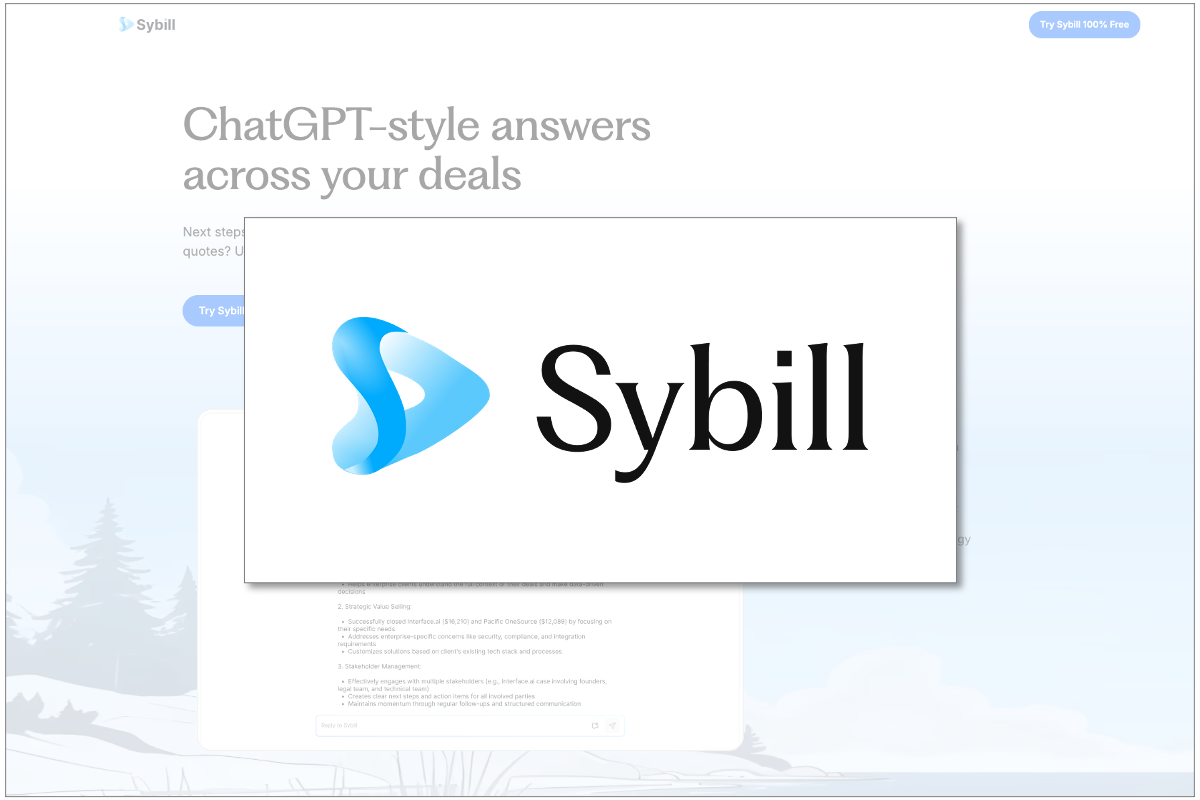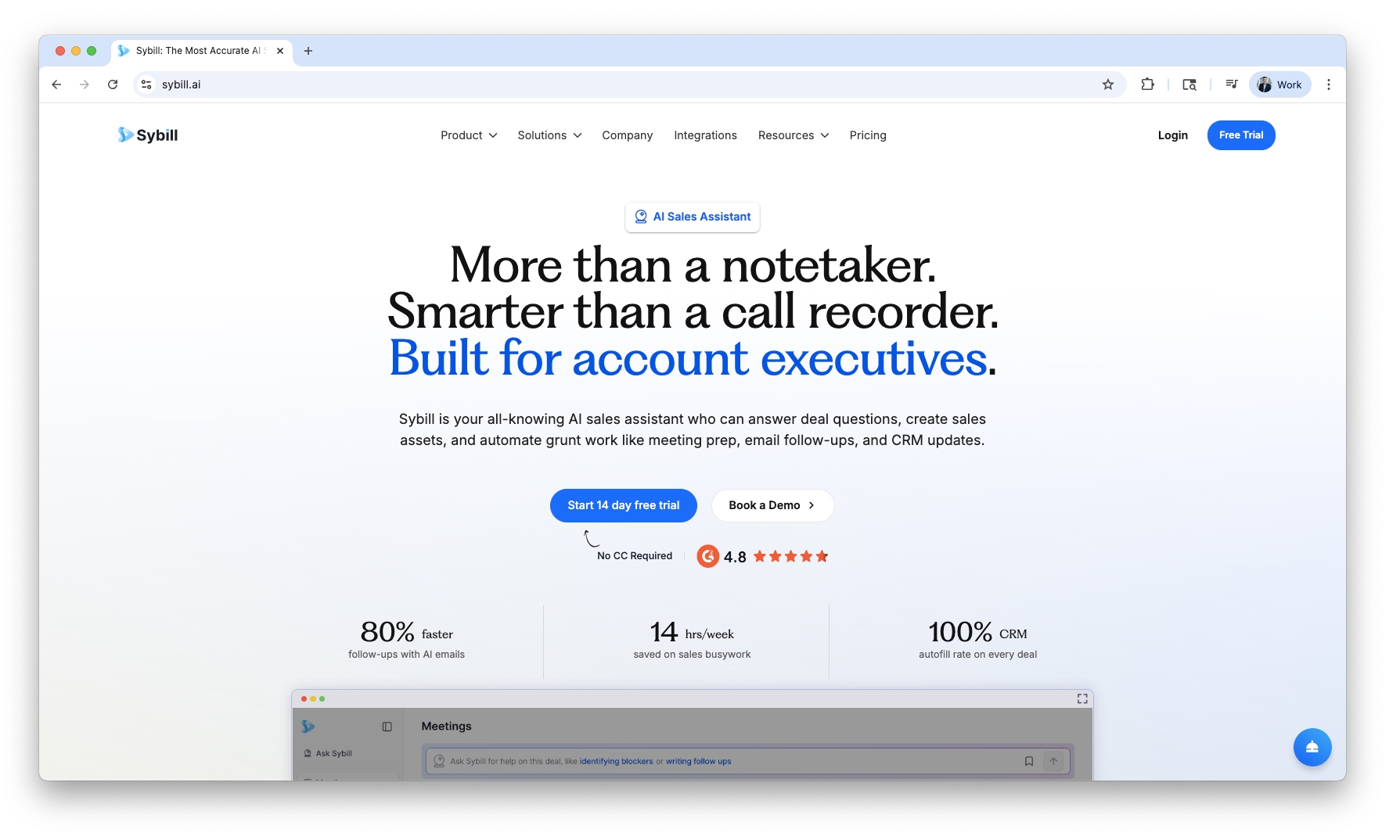


Sybill.ai is an AI-native conversation intelligence platform that analyzes sales calls for both what’s said and how it’s said—capturing tone, behavior, and buyer sentiment to surface actionable insights. It delivers real-time coaching, automatic follow-up emails, and deal risk indicators to help reps sell smarter and managers coach at scale. Unlike legacy tools that rely on transcripts alone, Sybill uses behavior-driven AI to predict buyer intent and drive better outcomes across the funnel.

Sybill.ai isn’t just another conversation intelligence tool trying to elbow its way into the Gong/Chorus market—it’s more like the emotionally intelligent cousin who also happens to have a photographic memory. Instead of just recording your calls, generating transcripts, and spitting out a few engagement metrics, Sybill claims to see beneath the surface of your sales conversations.
It’s built from the ground up as an AI-native platform, meaning its core features—emotion detection, behavior analysis, and automated follow-up—aren’t bolted on as an afterthought. The heart of Sybill lies in its Emotion + Behavior AI, which processes both verbal and non-verbal cues to assess prospect interest, confidence, and hesitations. This gives you a level of insight that even seasoned sales pros often miss in the heat of the moment.
If Gong is a library of everything said on a call, Sybill is more like a mind-reading coach who tells you what was really going on. It captures the conversation, interprets buyer sentiment in real time, and then turns those moments into actionable insights you can use immediately—whether it’s adjusting your talk ratio mid-call, following up with surgical precision, or forecasting deal risk before it blindsides you.
Sybill.ai isn’t for every sales org—it shines in environments where how something is said is as important as what is said.
- B2B SaaS Teams: Especially those in high-velocity, high-touch sales cycles where tone, pacing, and rapport can swing deals.
- Enterprise Account Executives: Who want to shorten deal cycles by spotting objections and disengagement earlier.
- Sales Leaders: Who want a scalable way to coach teams without drowning in hours of call recordings.
- Revenue Operations Managers: Who crave reliable, AI-backed indicators for forecasting beyond self-reported CRM updates.
- Founders/Startup Teams: Who need to understand prospect reactions without attending every single sales call.
- Enablement Leaders: Who want to turn rep performance data into repeatable playbooks that scale across the org.
If you’re running transactional, low-ACV sales where volume matters more than nuance, Sybill’s emotional intelligence features might be overkill. But if deal quality, trust-building, and subtle buying signals matter—this is your arena.
On-Call Performance Tuning
Real-time cues help reps adjust talk ratio, ask clarifiers, and land next steps—especially useful for new hires.
Post-Call Admin Offload
Auto notes and recap emails shrink the 15-minute post-meeting chore to ~2 minutes.
Deal Review & Med-Cycle Rescue
Stage-specific risk alerts surface deals missing decision criteria or multithreading—jump in before they stall.
Targeted Coaching Plans
Managers identify specific skills (e.g., discovery depth, pricing confidence) per rep and track improvement over time.
Message Testing at Scale
Product marketing sees which talk tracks spark engagement; enablement iterates on talk tracks with evidence.
Onboarding & Ramp
Curate “golden calls” with chaptered moments; new reps learn the beats of a great discovery or demo.
Forecast Hygiene
Conversation-derived signals corroborate CRM fields; less reliance on “gut feel” in the commit call.
Customer Success Hand-offs
Clean summaries transfer context from AE to CSM, reducing repeat discovery and churn-risk handoffs.
Compliance & Note Quality
Standardized call notes improve auditability and reduce the “he said, she said” scramble in complex deals.
- Behavior + Sentiment Intelligence: Sybill evaluates more than words. It ingests vocal dynamics (tempo, pauses, interruptions), turn-taking patterns, and conversation structure to assess engagement and momentum. This is materially different from “keyword-plus-sentiment” tools that over-index on transcripts; here, how something was said carries weight alongside what was said.
- Real-Time Conversation Assistant: Subtle prompts during calls (“ask a budget question,” “summarize next steps,” “you’re monologuing”) help reps avoid classic pitfalls. The magic is in the timing—nudges land contextually rather than flooding the screen.
- Auto-Follow-Ups & Summaries: Post-call, Sybill generates crisp, structured notes (problem, solution, objections, agreed next steps) and a near-sendable email recap. For teams sick of 15 minutes of admin after every meeting, this is the feature that turns skeptics into believers.
- Deal & Stage Risk Signals: Sybill tracks whether critical topics (timeline, decision criteria, stakeholders) are covered and whether buyer energy drops. It then bubbles this up as stage-specific risk so leaders can intervene before late-stage slippage.
- Coachable Moments Library: Patterns from top reps—how they open, the questions they ask, the way they handle pricing pushback—get flagged and reused in onboarding and call prep, turning tribal knowledge into an enablement asset.
- Privacy & Controls (pragmatic, not performative): Recording consent prompts, configurable retention windows, and role-based access give RevOps enough control to keep legal comfortable without turning setup into a quarter-long project.
PROS
- AI-native core: Not just summaries; models analyze tone, pacing, interruptions, and engagement to infer intent and risk.
- Real-time coaching: On-call nudges for talk ratio, pacing, and missed questions help reps self-correct without manager shadowing.
- Excellent follow-ups: Auto-generated emails that mirror the conversation flow and sound human (read: not like a robot on decaf).
- Coach at scale: Behavior trends roll up cleanly by rep/stage so managers know who needs help with what and where in the funnel.
- Low admin overhead: Quick deployment; minimal rules/configuration to get value.
- Cleaner UX than legacy CI: Less clicking through endless timelines; more “just show me the signal.”
- Pipeline visibility: Conversation-derived risk flags augment CRM hygiene and make forecast calls less… imaginative.
CONS
- Emotion inference is probabilistic: Brilliant when right, distracting when off—leaders should treat it as a signal, not gospel.
- Info density: Without an enablement plan, teams can drown in insights and under-use the best features.
- Integration depth varies: Works with common stacks, but very complex CRM custom objects/fields may need workarounds.
- Advanced analytics limits: If you want fully bespoke dashboards and warehouse-level joins, you may hit ceilings.
- Change management still required: Real-time nudges only help if reps adopt them (the age-old “tool vs. habit” problem).
Sybill’s core thesis—that behavioral signals predict outcomes—is exactly where conversation intelligence should be heading. The platform’s balance of real-time micro-coaching and post-call automation creates immediate rep value (less admin, better calls) while giving managers durable, skill-level insight. The follow-up emails are unusually usable out of the gate—specific, structured, and easy to tailor in 60 seconds. We also liked the velocity: you can go from “turn it on” to “this improved our calls” in a week, which is rare for CI platforms. Finally, the UX decision to prioritize signal density over slideshow dashboards respects a sales leader’s most precious resource—time.

Emotion AI is tricky business. When Sybill nails it, it’s a revelation; when it misses, it’s a reminder that AI can only approximate human intuition. Some reps may also feel a little “watched” knowing the platform is analyzing every tone shift and eyebrow raise. For larger enterprises, the reporting depth and customization may not yet match mature incumbents. And while its integrations are expanding, they’re not as comprehensive as Gong’s ecosystem—so check your tech stack before diving in.
Also, Sybill’s insights are only as good as your team’s willingness to use them. If managers aren’t ready to build coaching plans around this data, it can become another “cool tool” that doesn’t drive real change.
Expect modern CI pricing: per-user monthly fees with feature gating by tier. Typical mid-market deployments land in the $50–$80 per user/month zone for robust functionality (real-time nudges, AI summaries, CRM sync), with advanced analytics, extended retention, and deeper integrations reserved for higher tiers or enterprise quotes. Volume discounts and annual commitments are common. Budget a small RevOps window for integration/testing (days, not months) and some enablement time to define coaching rituals—where the ROI actually materializes. Speaking of ROI: shaving 10 minutes of post-call admin on 6 meetings/week is ~4 hours/month/rep; at $100 fully loaded hourly cost, Sybill pays for itself on admin time alone—before you count lift from better calls.
%20(1)%20(2).png)